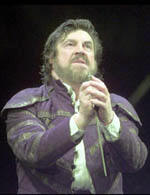In Remembrance: Alan Bates
 Alan Bates, who first gained fame on the London stage and went on to star in
a string of successful 1960s movies including Zorba the Greek, died
of cancer in a London hospital Saturday, December 27th, 2003. He
was 69.
Alan Bates, who first gained fame on the London stage and went on to star in
a string of successful 1960s movies including Zorba the Greek, died
of cancer in a London hospital Saturday, December 27th, 2003. He
was 69.
Bates was born in Derbyshire, central England. From the young age of 11, acting consumed his life and he earned a scholarship to London's Royal Academy of Dramatic Arts. He made his professional stage debut in 1955 and was considered as one of the most versatile actors of his generation. His widely regarded 1956 performance in Osborne’s "Look Back In Anger" in London's West End was the start of a lifelong stage career that included the works of Pinter, Ibsen and Shakespeare. His debut film performance was opposite Laurence Olivier in 1960's The Entertainer. He appeared in a number of movies in the early 1960’s, his most memorable roles as Basil in Zorba the Greek (1964) and in Georgy Girl (1966) with Lynn Redgrave.
An established screen actor, his work in The Fixer (1968) in which he starred opposite Dirk Bogarde, earned Bates a nomination for best actor Oscar award. He played Rupert Birkin in Women In Love, based on the D.H. Lawrence novel, the following year starring alongside Oliver Reed and Glenda Jackson.
Bates acted alongside Julie Christie in The Go-Between (1970) appeared in a number of roles in the 1970’s appearing both in film and television. He was well embraced by American audiences for his role in Paul Mazursky’s An Unmarried Woman (1978) and his star turn in The Rose (1979) opposite Bette Midler.
His film career continued through the 1980’s and 1990’s and included Duet For One (1986), sharing the bill with Julie Andrews and was cast in Franco Zeffirelli’s star–studded adaptation of Hamlet (1991) as Claudius.
Bates played the butler in Robert Altman’s 2001 murder mystery Gosford Park, and had an appearance in The Sum of All Fears (2002). This year he starred alongside Michael Caine in The Statement by director Norman Jewison. He was also set to appear in the American cable 2004 miniseries Spartacus.
Bates won a best actor Tony Award in 2002 for his portrayal in Broadway’s "Fortune's Fool," Turgenev's dark tale of mid-19th century Russian country life. Other notable achievements include being made a Commander of the British Empire in 1995 and knighthood at the end of 2002.
- John Gibbon